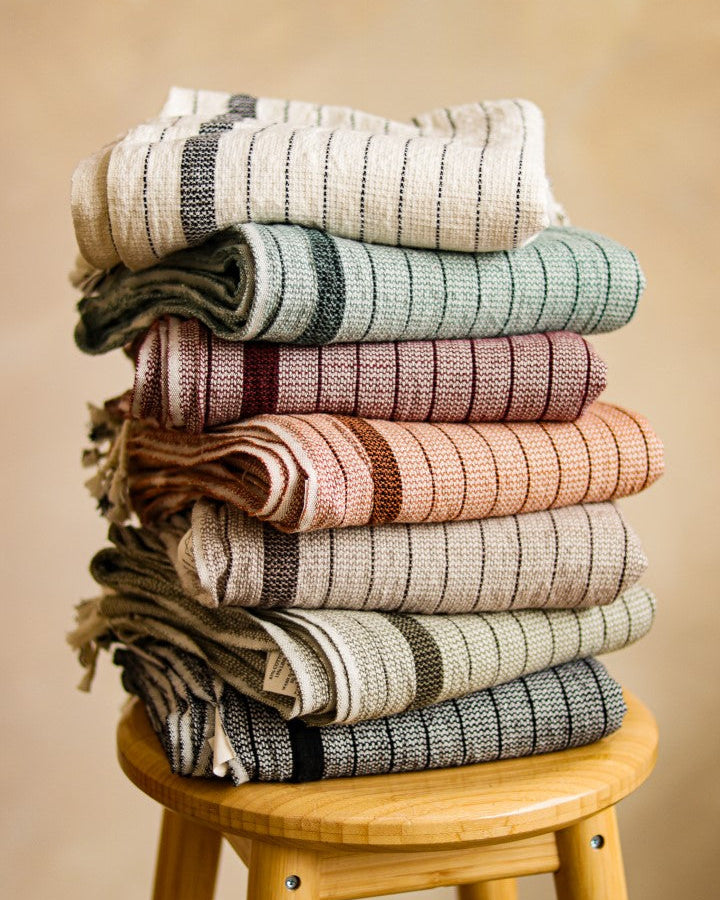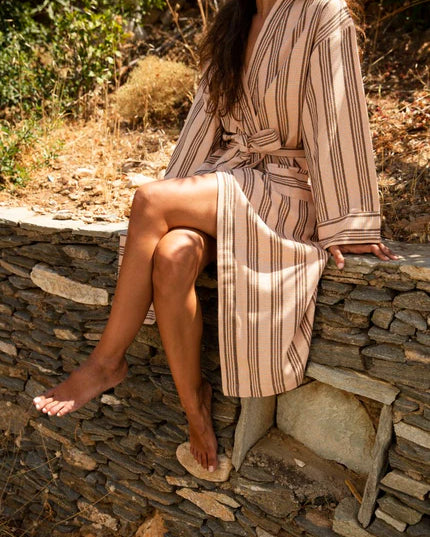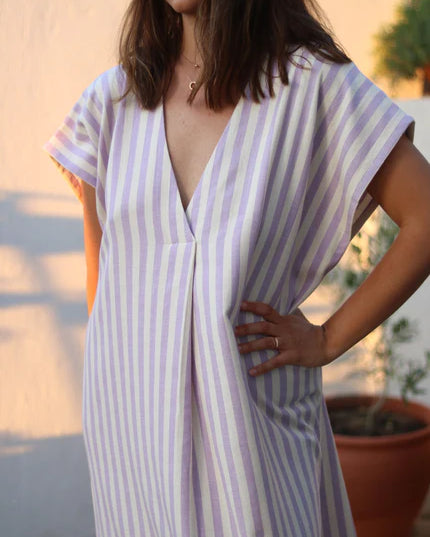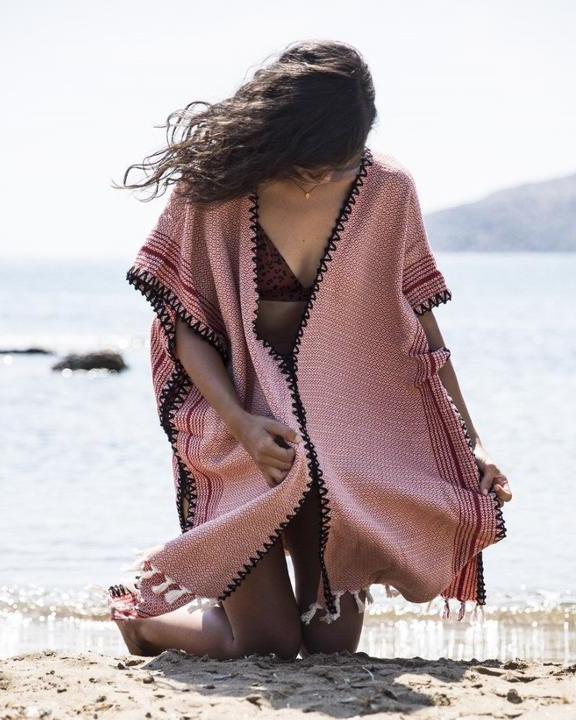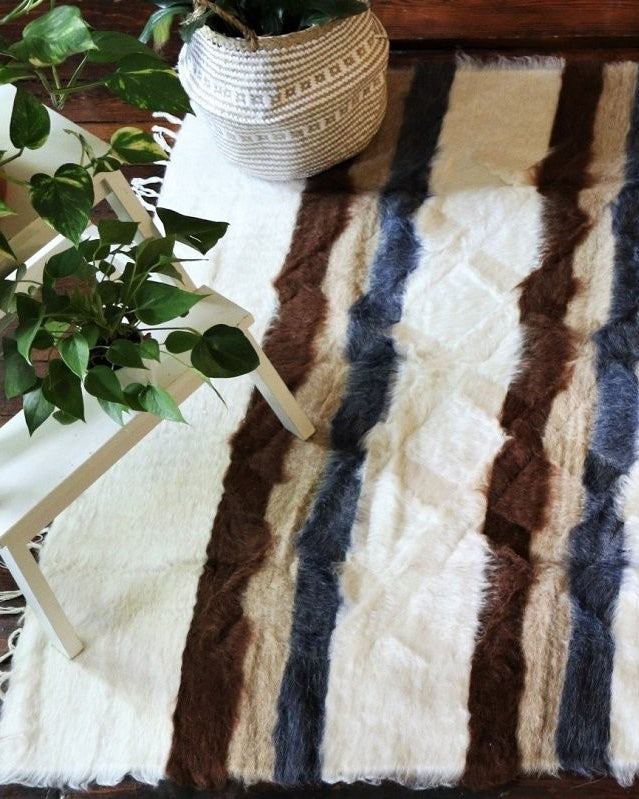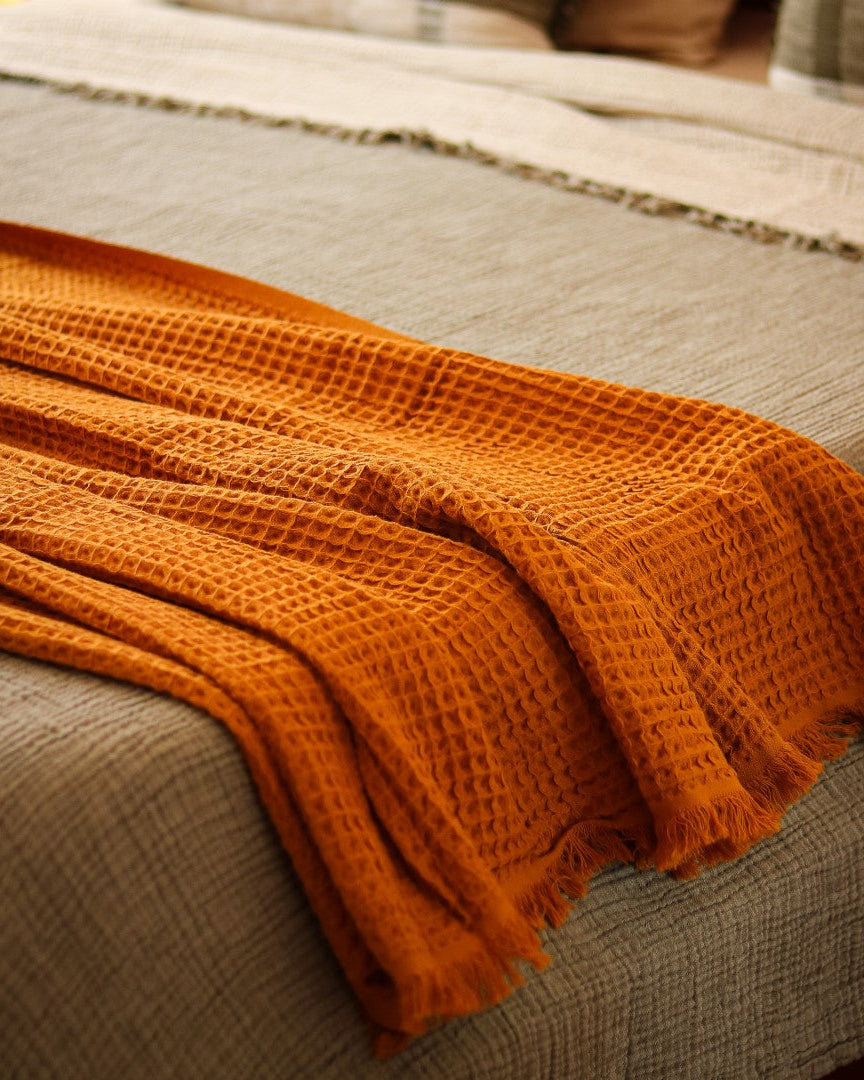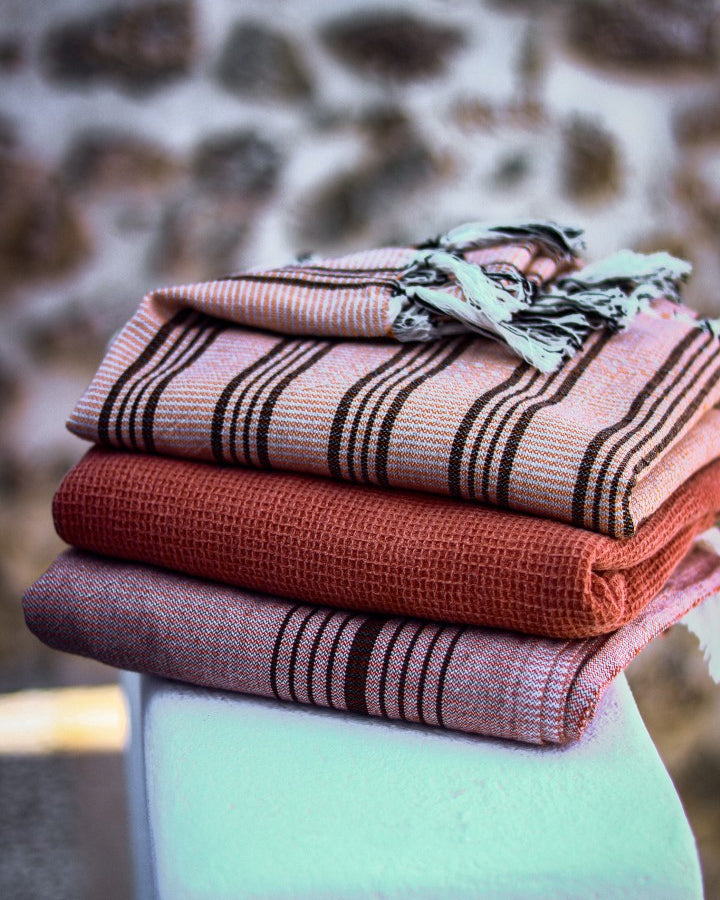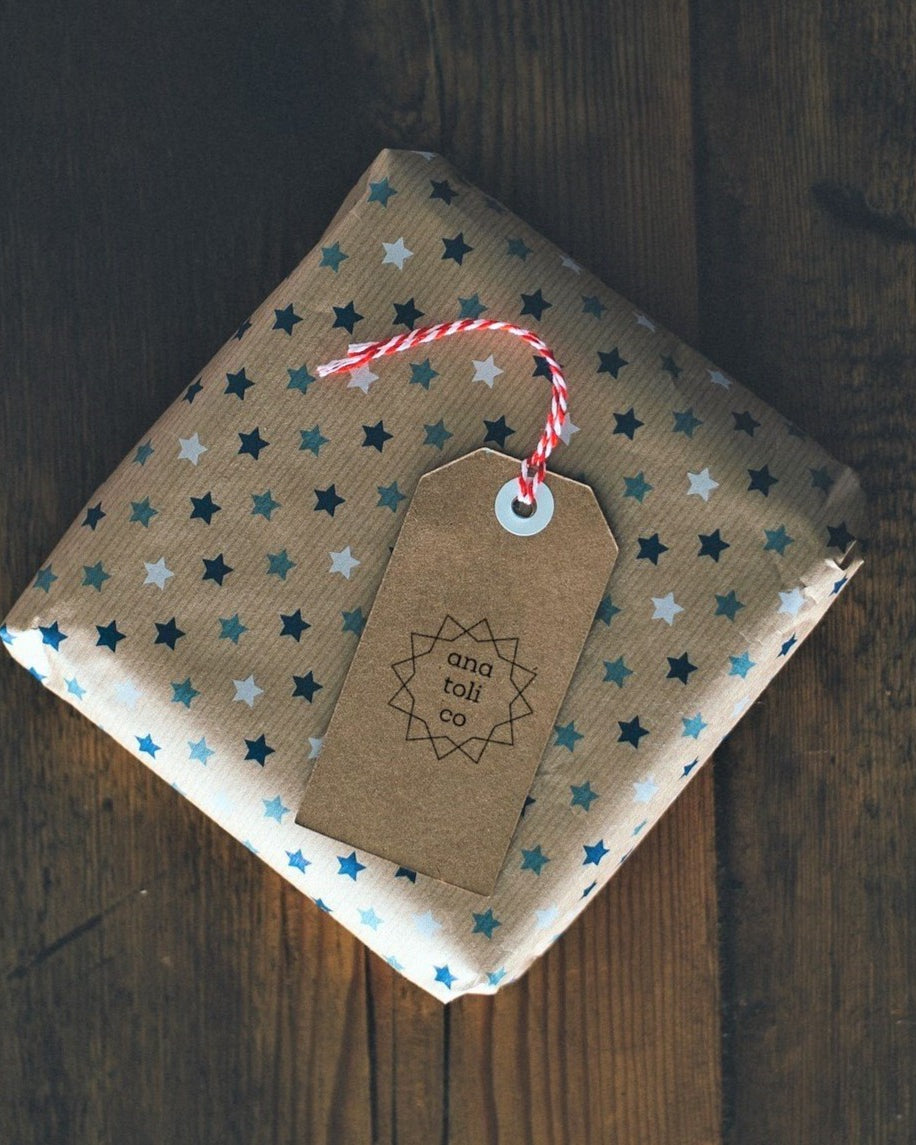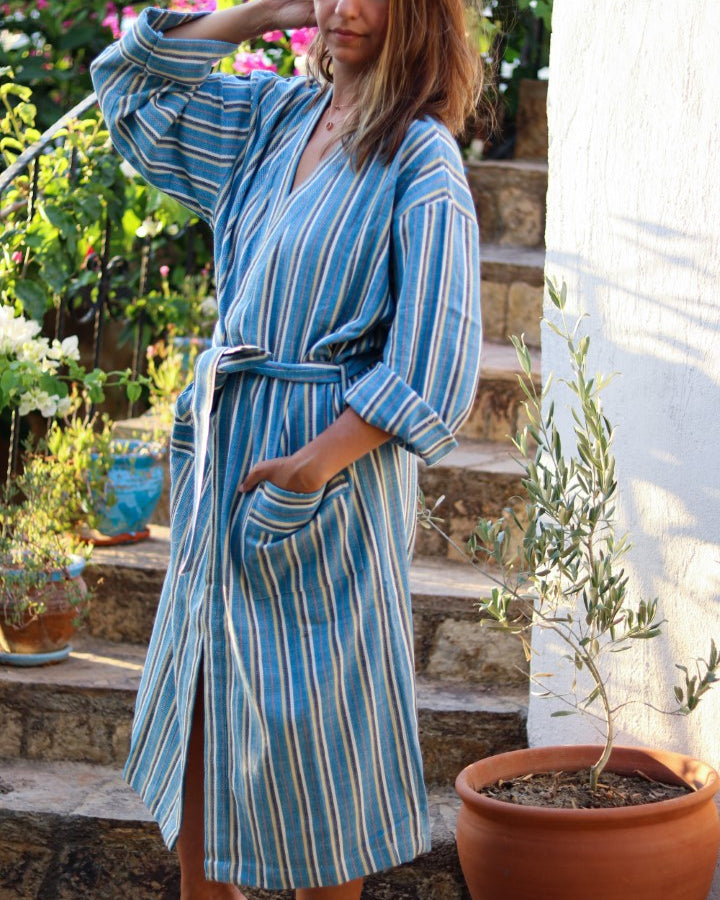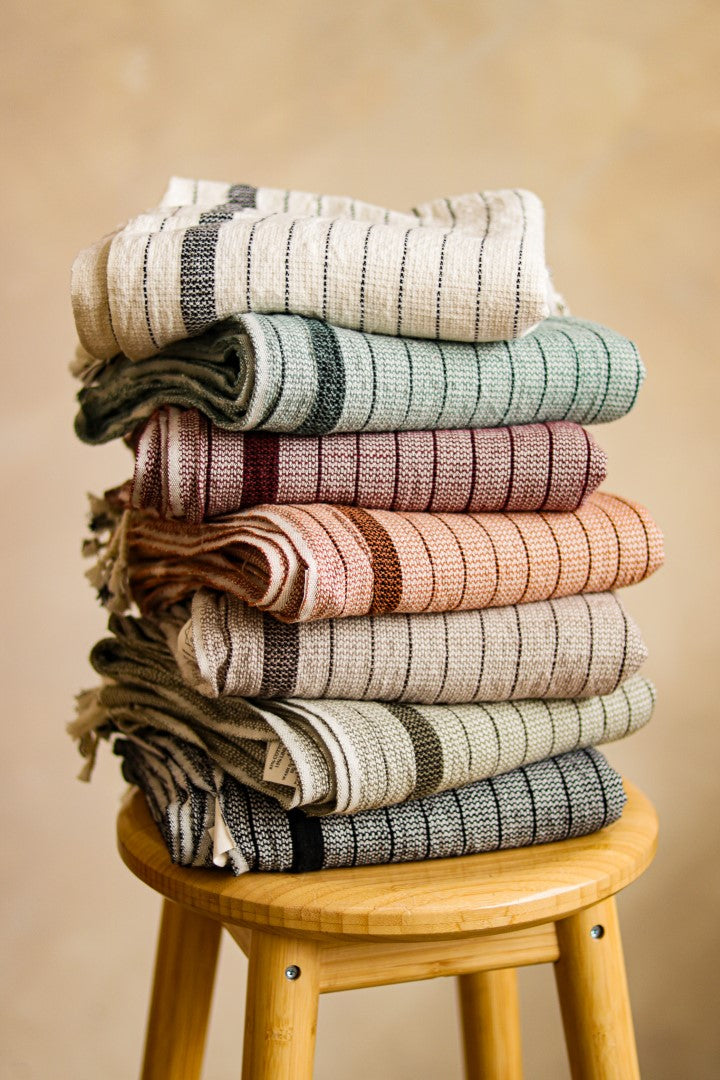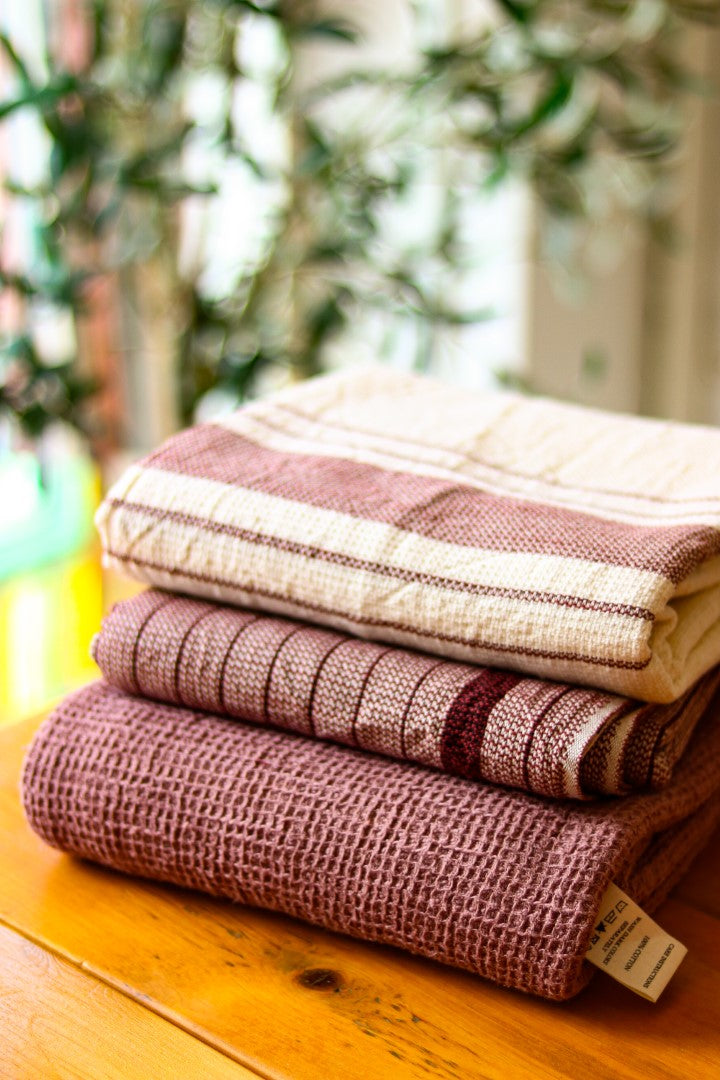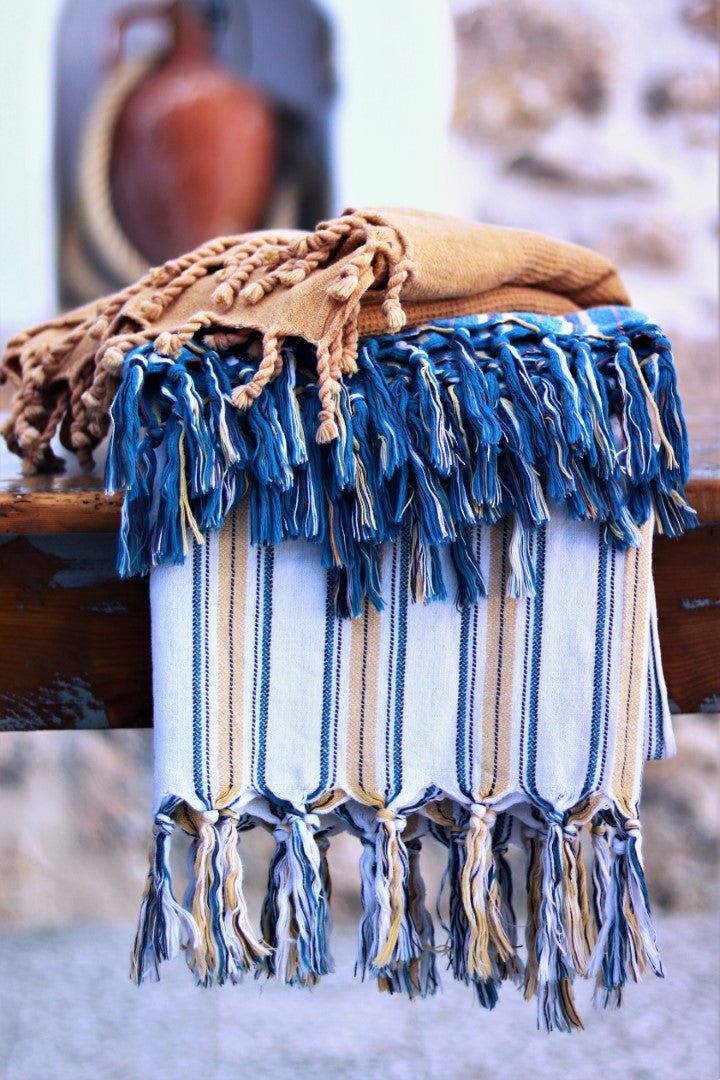When you have sensitive skin, the right towel can make all the difference. We’ve found that the best towels are almost always made from 100% long-staple cotton, like Turkish cotton, with a smooth weave and an OEKO-TEX certification. This combination ensures your towel is free from nasty chemicals, minimizes friction, and turns drying off from a chore into a genuinely caring ritual.
Why Your Towel Is Actually a Skincare Tool
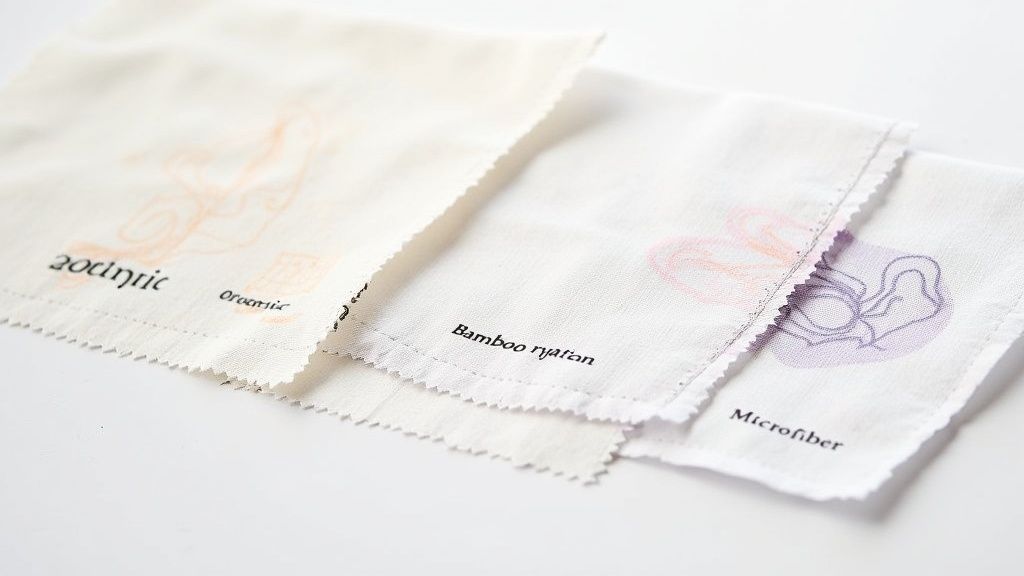
If your skin is reactive, you already spend a lot of time vetting every cleanser, moisturizer, and sunscreen that comes near it. But what about the towel you use every single day? It’s often the last thing people think about, but your towel is a crucial part of your skincare routine.
Think about it this way: you wouldn't spend all that time carefully applying gentle, nourishing products just to scrape them off with something harsh and abrasive. It’s like polishing a delicate piece of antique wood with sandpaper. It completely undoes all your hard work and can easily leave behind redness, micro-tears, and inflammation.
The Hidden Irritants in Your Bathroom Linen
The trouble with most towels usually boils down to two things: the physical feel of the fabric and the invisible chemical residues hiding within it. Many mass-produced towels use short, coarse fibers that create a lot of friction against the skin. With every wash, these fibers get stiffer and even more aggressive.
Beyond the texture, the manufacturing process itself can be a source of irritation. Harsh dyes, finishing agents, and other chemicals used to treat the fabric can linger long after you bring the towel home, potentially triggering contact dermatitis or other allergic reactions. This is why a towel is so much more than just a tool for drying off—it's a textile that makes direct contact with your body’s largest organ.
Your towel is the final step in your cleansing routine. Choosing one that is abrasive or laden with chemicals can undo the benefits of your skincare products and actively contribute to skin sensitivity.
The Growing Demand for Softer, Safer Textiles
The huge boom in skin-friendly products isn't just a fleeting trend; it reflects a real and growing need. In 2023, the global market for sensitive skin care products was valued at a massive USD 44.6 billion, and it's projected to climb to nearly USD 81 billion by 2030. You can explore the data behind the sensitive skin care market growth on grandviewresearch.com.
This incredible growth shows just how many of us are becoming aware of the impact everyday items have on our skin's health. This is exactly where thoughtfully crafted textiles, like those from Anatolico, come in. By focusing on superior materials, gentle weaves, and verified safety certifications, we can finally turn a daily necessity into a protective, soothing experience.
Choosing the Right Fabric for Your Skin
When you have sensitive skin, the material your towel is made from is everything. Think of it like a skincare product—some fabrics soothe and coddle your skin, while others can be downright irritating. The key is to understand what makes a towel gentle, so you can pick one that calms instead of aggravates.
You’re looking for a fabric with long, smooth fibers that cause as little friction as possible. The goal is to gently pat your skin dry and have the towel do all the work, absorbing water quickly without any rough rubbing. That rubbing action can lead to tiny micro-abrasions and inflammation, which is the last thing you want if you're dealing with conditions like eczema or rosacea.
The Power of Premium Cotton
Not all cotton is created equal, especially when it comes to sensitive skin. What really sets a premium towel apart from a standard one is the length of the cotton fiber, also known as its staple. This is where special varieties, like Turkish cotton, really step up.
Turkish cotton is known for its extra-long staples. These long, elegant fibers are spun into yarns that are not only stronger but also much finer. The result is a towel that’s naturally softer and far less likely to pill or get scratchy over time. Because of this structure, there are fewer exposed fiber ends to poke and irritate your skin, giving you a truly gentle touch every time.
A towel woven from long-staple cotton literally glides over your skin instead of dragging. This one simple difference can dramatically reduce irritation and help protect your skin's natural barrier, which is often a weak point for sensitive skin types.
The demand for natural, skin-friendly fabrics is growing worldwide. In fact, the pure cotton face towel market hit a value of USD 2.5 billion in 2024 and is still climbing. This trend makes it clear that more and more people are prioritizing their skin's health. You can discover more insights about the cotton towel market to see just how much consumer preferences are changing.
If you're curious about what makes this material stand out, take a look at our guide on what is Turkish cotton to learn more about its unique benefits.
Exploring Other Skin-Friendly Materials
While premium cotton is a fantastic choice, it’s not the only option. A few other materials bring their own unique advantages to the table for reactive skin, each with a different feel and performance.
- Bamboo Rayon: Often described as feeling like silk or cashmere, bamboo towels are incredibly soft to the touch. They're also super absorbent and have some natural antimicrobial qualities, which helps them stay fresh a bit longer.
- Microfiber: This synthetic material is famous for its amazing softness and how quickly it soaks up water. The catch? You have to wash it correctly. That means no fabric softeners and only low heat, otherwise, the fibers can stiffen up and lose their gentle touch.
This infographic breaks down how these popular materials stack up against each other.
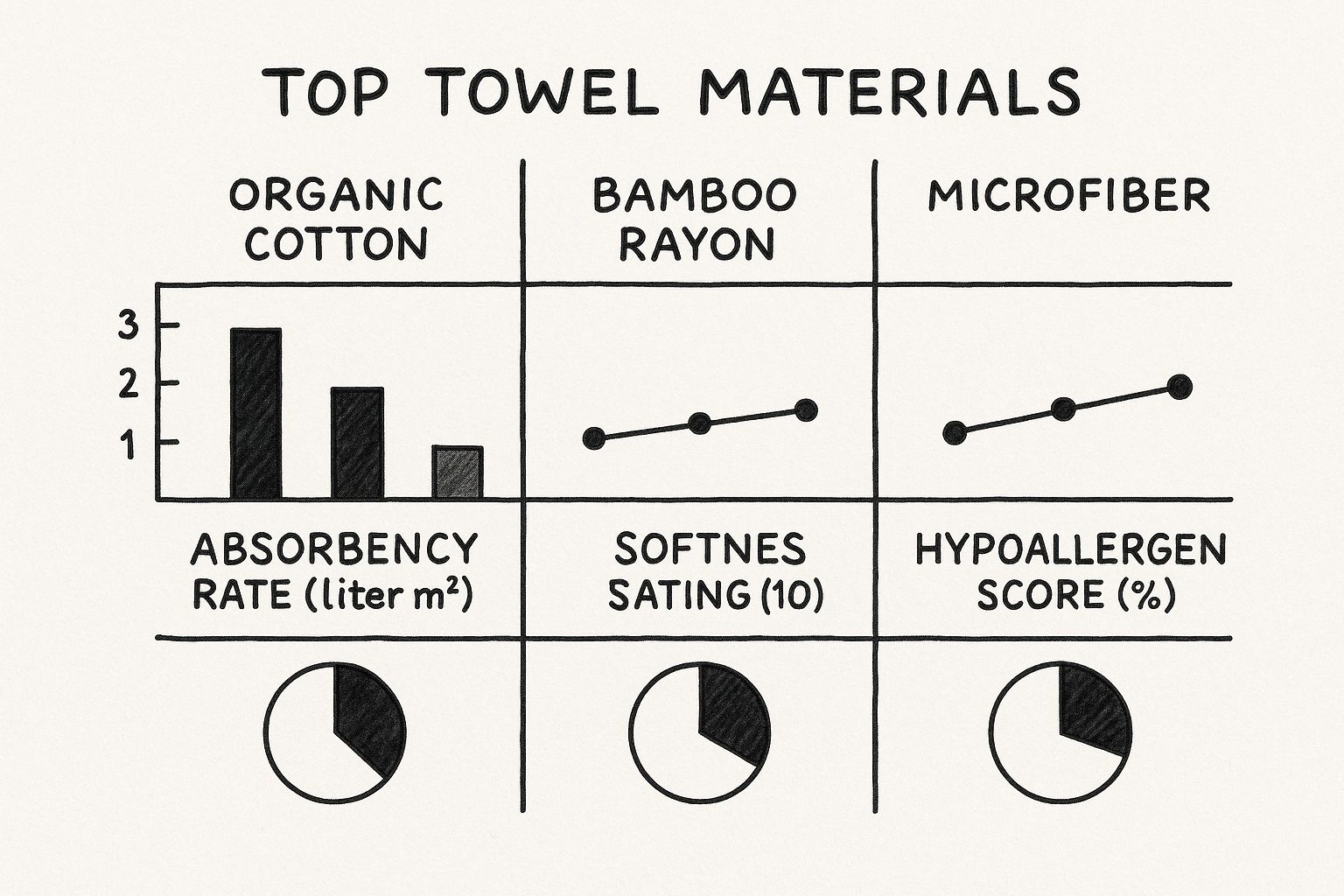
As you can see, while all three are strong performers, organic cotton and bamboo rayon really pull ahead on softness and hypoallergenic properties. This makes them the top contenders for skin that's easily upset.
Comparing Towel Materials for Sensitive Skin
To make things even clearer, here’s a quick side-by-side comparison. This table breaks down the top towel materials, looking at the factors that matter most for sensitive skin.
| Material | Softness Level | Absorbency | Hypoallergenic | Best For |
|---|---|---|---|---|
| Turkish Cotton | Very soft and gets softer with each wash | High | Excellent (naturally pure and chemical-free) | Daily use, sensitive skin, and those who want a balance of softness and quick-drying. |
| Bamboo Rayon | Exceptionally soft, almost silky | Very High | Excellent (natural antimicrobial properties) | Ultimate luxury, very sensitive or allergy-prone skin. |
| Microfiber | Extremely soft when new | Highest | Good (but can trap allergens if not washed properly) | Quick-drying needs like gym or travel, but requires specific care. |
Ultimately, Turkish cotton and bamboo rayon are often the safest bets. They offer that perfect combination of gentle touch and natural purity that sensitive skin craves.
How Weave and Weight Impact Skin Comfort
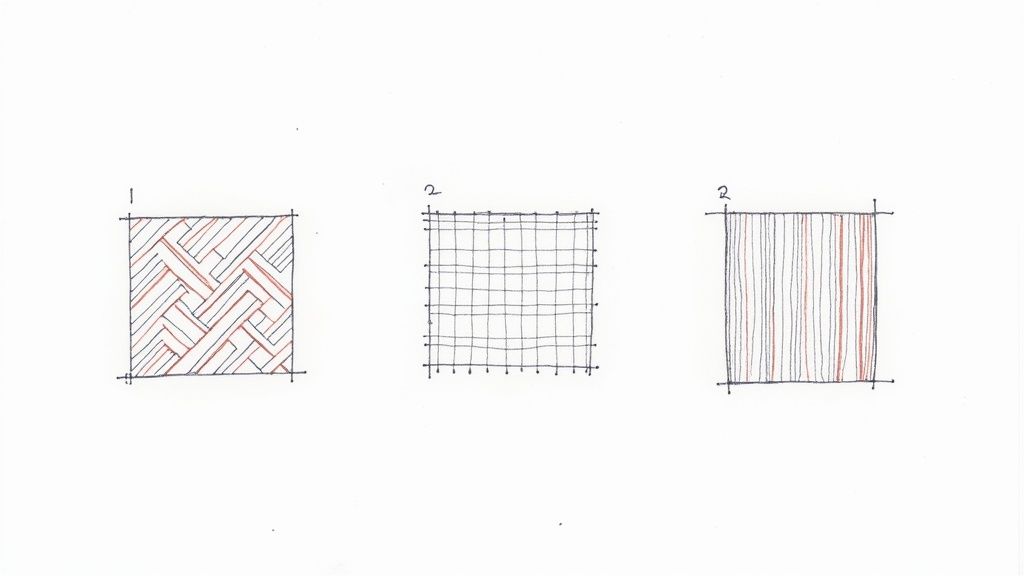
Choosing the right material is a fantastic start, but it's only half the story. The way a towel is actually constructed—its weave and its weight—is just as crucial for how it feels against your skin. These are the technical details that separate a genuinely gentle towel from one that just looks nice hanging on the rack.
Most towels on the market use a terry loop weave. You know the kind: classic, fluffy, and covered in thousands of tiny, absorbent loops. While those loops are great at soaking up water, they can also create a surprising amount of friction. For easily irritated skin, this can feel less like drying off and more like scrubbing down with a scratchy cloth.
The Gentle Glide of a Flat Weave
This is where a flat weave changes the game entirely. Instead of a field of loops, picture a smooth, uniform surface. This design lets the towel glide across your skin, cutting down on the friction and rubbing that often lead to redness and irritation.
A flat weave isn't about aggressive, heavy-duty absorption; it’s designed for a gentle and effective pat-dry. It’s the perfect solution for anyone whose skin protests at the slightest hint of abrasion.
A flat weave towel works with your skin, not against it. Its smooth surface respects your delicate skin barrier, turning the simple act of drying off into a soothing, non-irritating ritual. This is especially important for managing conditions like eczema or rosacea.
Understanding Towel Weight (GSM)
The other key detail to look at is the towel's weight, which is measured in GSM (Grams per Square Meter). Think of GSM as the fabric equivalent of thread count in sheets—it’s a simple measure of density. Generally, a higher GSM means a thicker, heavier, and more absorbent towel.
Here’s a quick guide to what those numbers actually mean:
- 300-400 GSM: These are your lightweight, quick-dry towels. They’re thinner and won't feel particularly plush, but they dry in a flash.
- 400-600 GSM: This is the sweet spot for many people. It’s a medium weight that balances softness, absorbency, and a reasonable drying time. Most quality household towels live in this range.
- 600-900 GSM: Welcome to the world of heavy, luxurious, hotel-style towels. They feel incredibly dense and plush, but they can take forever to dry, which can be an issue in humid climates.
It’s tempting to think heavier is always better, but for sensitive skin, that isn’t the case. A super-heavy, high-GSM towel can be bulky and hold onto moisture for too long, which isn't great for skin hygiene.
For sensitive skin, a mid-weight towel, often somewhere in the 500-700 GSM range, strikes the perfect balance. You get all the luxurious softness and high absorbency you want, without it feeling overwhelming or staying damp for hours.
Navigating Certifications for Skin Safety
How can you really know if a towel is pure and free from hidden irritants? A towel might feel soft, but its journey from cotton field to your bathroom can involve a cocktail of harsh chemicals, dyes, and finishing agents. These residues linger in the fibers, just waiting to aggravate sensitive skin.
This is where third-party certifications come into play. Think of them as a safety guarantee for your skin. These labels aren't just marketing fluff; they are a verifiable promise that an independent body has scrutinized the product against strict global standards for harmful substances. For anyone looking for the best towels for sensitive skin, these certifications are an absolute must.
They offer the peace of mind that the fabric touching your skin every day is genuinely as clean and safe as it claims to be, protecting you from potential triggers for redness and irritation.
Understanding Key Textile Certifications
The most crucial label to look for is OEKO-TEX STANDARD 100. This certification is a big deal because it guarantees that every single part of the towel—from the cotton threads to the dyes—has been rigorously tested for a long list of harmful substances. It’s a comprehensive health check for your textiles.
When you see the OEKO-TEX label, it means the towel is free from allergens, carcinogens, and other nasty chemicals that could otherwise absorb into your skin. It’s the foundational seal of approval for skin safety.
Another important certification is the Global Organic Textile Standard (GOTS). This label takes things a step further. It not only verifies the organic status of the cotton, ensuring it was grown without synthetic pesticides or fertilizers, but it also imposes strict environmental and social criteria throughout the entire production chain.
This focus on purity is more important than ever. The global luxury towels market was valued at around USD 5.7 billion in 2023, and as it grows, so does the risk of counterfeit products that skip these critical safety checks. You can learn more about the luxury towels market forecast to see just how big the industry is getting.
Ultimately, these certifications empower you to make an informed choice with confidence. If you want to dive deeper into what these labels mean for your family's health, you can learn more about what OEKO-TEX certified means in our detailed guide.
Keeping Your Towels Soft and Irritant-Free

Even the most luxurious, skin-friendly towel can turn into an irritant if you don't care for it properly. Think of it like a delicate sweater—it needs a specific routine to maintain the soft, gentle qualities your sensitive skin relies on. This is more than just about keeping things clean; it’s about protecting your investment and, more importantly, your skin.
Your care routine starts the moment you bring a new towel home. Giving it a wash before its first use is a non-negotiable step. This initial cycle clears away any dust or lint from the factory and helps "bloom" the cotton fibers, kicking their absorbency into high gear from day one.
The Right Way to Wash Your Towels
When it comes to laundry, your choice of detergent matters just as much as the towel itself. To avoid triggering sensitive skin, you'll want to use gentle, phosphate-free laundry detergents. Look for formulas without added dyes, fragrances, or harsh chemicals that can leave behind a residue and cause irritation.
And here’s a tip that might seem backward at first: skip the fabric softener. It seems like it would help, but most fabric softeners coat the towel fibers in a waxy film. This coating actually reduces absorbency and can trap allergens, eventually making your soft towels feel stiff and less effective.
A towel’s softness comes from its fibers, not from added chemicals. Using harsh detergents or fabric softeners is like clogging the pores of your towel, making it less absorbent and potentially irritating.
Here are a few more pro tips for wash day:
- Wash in Warm, Not Hot, Water: High heat is the enemy of delicate cotton fibers. Over time, it can make them brittle and harsh. Warm water gets the job done without causing unnecessary damage.
- Don't Overload the Washer: Your towels need room to tumble and rinse properly. A crowded machine can’t wash away all the detergent, leaving behind a residue that irritates the skin.
- Use Vinegar Occasionally: About once a month, add a cup of white vinegar to the rinse cycle. It’s a fantastic natural way to break down any soap buildup and bring back that original softness and absorbency.
Gentle Drying for Lasting Softness
The final step to preserving that cloud-like texture is the drying process. Always tumble dry your towels on a low or medium heat setting. Blasting them with high heat essentially "bakes" the fibers, leaving them feeling stiff and scratchy.
For a chemical-free softness boost, toss in a few wool dryer balls. They bounce around, separating the towels and allowing warm air to circulate more freely. This not only shortens drying time but also naturally fluffs the fibers, leaving them incredibly soft.
For a complete breakdown of towel maintenance, check out our guide on how to care for your Turkish towel.
Your Guide to Towels for Sensitive Skin
When you have sensitive skin, choosing the right towel is so much more than just picking a soft one. It’s a crucial part of your daily skincare routine. But with so many options out there, it’s easy to feel lost.
Let's cut through the noise. This final checklist pulls together everything we've talked about, giving you a simple, clear roadmap to finding a towel that will calm your skin, not cause a flare-up.
Your Essential Towel Checklist
Think of these three points as the non-negotiables. They are the foundation of what makes the best towels for sensitive skin a true investment in your daily comfort and long-term health.
-
Premium, Long-Staple Material: Always start with the fiber itself. Look for 100% Turkish cotton. Its long, silky fibers mean less friction and a much smoother feel against your skin. Plus, it’s naturally durable, so it stays gentle even after many washes.
-
A Smooth, Gentle Weave: How the towel is made is just as important as what it's made from. A flat weave is your best friend here. It’s designed to glide effortlessly across your body, avoiding the scratchy, abrasive feel you can get from a standard looped terry cloth towel. This simple difference helps protect your skin’s delicate barrier.
-
Verified Safety Certifications: This is the one step you should never skip. Always look for the OEKO-TEX Standard 100 certification on the label. It’s your guarantee that the towel is completely free of harmful chemicals, harsh dyes, and any nasty residues left over from manufacturing. It’s the ultimate seal of approval for skin safety.
A towel isn't just a purchase; it's an investment in your skin's daily comfort and long-term health. Prioritizing material, weave, and purity ensures that every time you dry off, you're actively caring for your skin.
Anatolico towels bring all these principles to life. We start with artisan-woven, long-staple Turkish cotton, use a gentle flat weave, and ensure every single towel is OEKO-TEX certified. It's a towel designed from the ground up with skin wellness in mind—a real-world solution that checks every box on this list.
Of course, towels are just one piece of the puzzle. For a more complete look at managing sensitive skin, check out this guide to the 7 best products for sensitive skin. Making thoughtful choices about everything that touches your skin is the real key to lasting comfort.
Got Questions About Towels for Sensitive Skin? We've Got Answers.
When your skin is reactive, even something as simple as choosing a towel can feel complicated. You've learned about weaves and materials, but a few practical questions always seem to pop up. Let's tackle some of the most common ones.
Think of this as your go-to guide for the everyday details. Getting these things right can make a huge difference in keeping your skin calm, happy, and free from irritation.
How Often Should I Replace My Towels?
A good rule of thumb is to swap out your towels for new ones every one to two years. No matter how high-quality they are, the fibers inevitably start to break down after countless cycles in the washer and dryer. When that happens, they lose their softness, don't absorb as well, and can feel rough against your skin.
Plus, older towels can become a hiding place for detergent residue and microbes that a normal wash cycle won't completely eliminate. If your towel feels stiff or isn't drying you off like it used to, that's your cue—it's time for a replacement.
A towel's lifespan is about more than just wear and tear. For sensitive skin, a fresh, effective towel is a crucial part of your daily skincare routine.
For Eczema, Are Bamboo or Cotton Towels Better?
This is a great question. Both premium Turkish cotton and bamboo can be fantastic for eczema, but they have slightly different strengths. Bamboo gets a lot of praise for its silky texture and natural antimicrobial qualities, which helps keep it fresh.
That said, high-quality, long-staple Turkish cotton is the gold standard for its proven blend of incredible softness, absorbency, and durability. Honestly, the weave of the towel often matters more than the fiber itself. A flat-woven Turkish cotton towel, for instance, will create far less friction on delicate skin than a traditional looped terry towel, regardless of the material.
Do I Really Need a Separate Towel for My Face?
Yes, you absolutely do. This is one of the single best habits you can adopt for sensitive skin. Your body towel comes into contact with different bacteria and leftover products from your body wash—things you definitely don't want on your face.
Bringing those microbes to your face is a fast track to clogged pores, breakouts, and irritation. The best move is to use a smaller, exceptionally soft towel just for your face and wash it often, ideally after every two or three uses. It’s a simple change that keeps your complexion protected.
Ready to feel the difference a truly skin-friendly towel can make? Explore the Anatolico collection of artisan-woven, OEKO-TEX certified Turkish towels and discover the ultimate in softness and purity. Shop now at anatolico.co.

